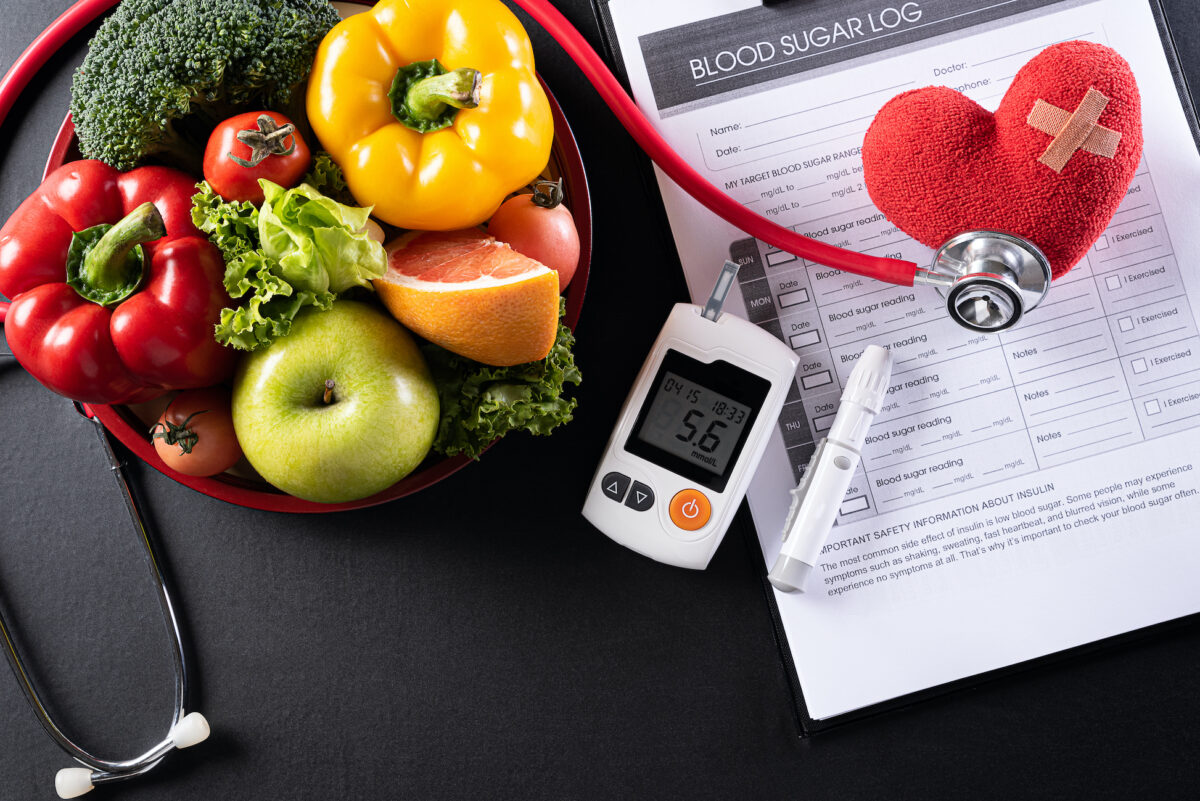


Insulin resistance is a condition that occurs when the body’s cells become less responsive to the hormone insulin, which plays a critical role in regulating blood sugar levels.
Over time, this can lead to the development of serious health conditions such as Type 2 diabetes, heart disease, and obesity. Fortunately, following an insulin resistance diet has been shown to have numerous health benefits, even for people who don’t have diabetes, or aren’t overweight or obese.
Insulin resistance is a condition that can affect anyone—temporarily or chronically. Left untreated, chronic insulin resistance could lead to prediabetes and eventually Type 2 diabetes.
Prediabetes is when your blood sugar levels are higher than normal, but not yet high enough to be diagnosed as diabetes. It typically occurs in those who are already living with some degree of insulin resistance.
It’s important to keep track of your blood sugar levels to know when you’re becoming insulin resistant. Your doctor can check this using a special test that finds out your average blood sugar levels over three months. It’s called the baseline A1C test.
It’s recommended that adults who are over age 45, overweight, and have risk factors for prediabetes or Type 2 diabetes be tested.
The insulin resistance diet is a nutritional approach that aims to regulate blood sugar levels by reducing the intake of foods that are high in sugar, refined carbohydrates, and unhealthy fats. Instead, it emphasizes the consumption of foods that are low in carbohydrates, high in fiber, and rich in healthy fats and proteins.
The goal of this diet is to help the body use insulin more effectively.
“A diet rich in minimally processed whole foods containing fiber, lean protein, and healthy fats [is] best for insulin resistance and diabetes,” Emily Feivor, a registered dietitian at Long Island Jewish Forest Hills, part of Northwell Health in New York, told The Epoch Times.
The diabetes plate method is an easy way to eat meals that help manage your blood sugar levels.
The American Diabetes Association recommends starting with a dinner plate that’s about nine inches across. You’ll then fill half your plate with non-starchy vegetables like broccoli, asparagus, or Brussels sprouts.
Next, fill one-quarter of your plate with lean protein foods. These include chicken, salmon, and lean beef. The last quarter of the plate will consist of healthy carbohydrates that can include whole grains, fruit, and beans. Finally, any beverage you include with your meal should be zero-calorie, or simply water.
Feivor recommends that people who want to control their blood sugar avoid refined and processed carbohydrates.
For example, eat steel-cut oats instead of sweetened instant oatmeal. Also, avoid processed meat/high-fat red meats because they’re high in saturated and trans fats, and avoid drinking too many alcoholic or sugary beverages.
Besides reducing the risks of diabetes or its complications, eating an insulin resistance diet offers at least six important health benefits.
A primary benefit of following the insulin resistance diet is improved heart health.
High blood sugar can damage blood vessels, increasing the risk of heart disease. An insulin resistance diet helps reduce this risk by regulating blood sugar levels.
Research published in the British Medical Journal found that eating a diet high in sugar for just a few weeks led to about one-third of men experiencing many changes typically seen in heart and vascular disease. However, a diet low in added sugars and refined carbohydrates was found to reverse this.
Being overweight or obese is linked to insulin resistance. By reducing the intake of carbohydrates and sugar, an insulin resistance diet can help individuals lose weight and reduce their risk of obesity.
“Weight loss and physical activity can play an important role in improving insulin resistance,” said Feivor.
Individuals who follow an insulin resistance diet often report improved energy levels. This could be because the diet encourages the consumption of nutrient-dense foods that provide sustained energy throughout the day.
A randomized controlled feeding trial published in the journal Appetite found eating a low glycemic index diet (very similar to an insulin resistance diet) was associated with “significantly” higher scores for vigor/activity and significant reductions in fatigue compared to a high glycemic index (high sugar) diet.
Additionally, regulating blood sugar levels can prevent the highs and lows associated with a diet high in sugar and refined carbohydrates.
Chronic inflammation is a risk factor for many health conditions, including heart disease, cancer, and even dementia.
High blood sugar levels can contribute to inflammation in the body. By regulating blood sugar levels, an insulin resistance diet may reduce inflammation and improve overall health.
The brain relies on glucose for energy, but high levels of glucose can be damaging to brain cells. By regulating blood sugar levels, an insulin resistance diet could protect the brain and improve cognitive function.
A study published in the journal Advances in Nutrition found that a low glycemic index diet improved cognitive function. This might be due to lower blood sugar concentration after a low glycemic index meal that caused brain changes that made participants feel less stressed or nervous before memory tests, improving their performance.
Following an insulin resistance diet might also reduce cancer risk. There is strong evidence that high levels of insulin contribute to the growth of cancer cells.
By reducing our intake of carbohydrates and regulating blood sugar levels, an insulin resistance diet can reduce the amount of insulin in the body to potentially reduce the risk of cancer. Research shows that a low-carbohydrate, high-protein diet (also good for insulin resistance) not only reduces cancer risk, but can also slow tumor growth if cancer is already present.
